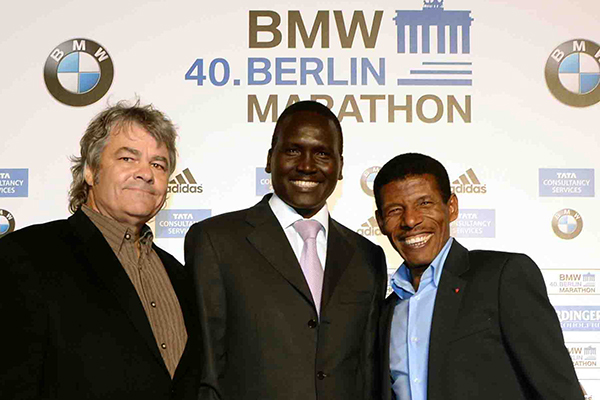
At high noon on the 22nd of April, Mo Farah ran alone down The Embankment towards Big Ben, and with each labored stride the much-decorated trackster was earning his stripes as a marathoner.
No: Mo was not covering London Marathon ground at the breathtaking speeds that he brought to the Olympic oval a few kilometers east of here. In this case—after sticking to Eliud Kipchoge’s WR pace through almost 30K—holding form, defending his podium position and getting home in 2:06:21 to better Steve Jones’ venerable 33 year-old UK record were all major wins on this day.
Four years after dabbling in a 2:08:21 debut marathon, this was Mo’s first post-track career effort. He is in a good place with the management of Ricky Simms and the guidance of Gary Lough, who comes to Farah’s corner benefiting from a long-term spousal and coaching relationship with one Paula Radcliffe.
Farah adds a whole lot of talent, personality, and some casual cool to the serious business of marathoning – and this is just considering the media events. Based on his 3rd-place showing in London, it also appears Mo will also have an expanding imprint on the racing.
From the get-go it has been readily apparent that Mo has been all-in as a marathoner. “This year I have gone completely to the marathon,” he says with a wide smile, adding “I really enjoyed preparing for the marathon. The last 3 months I’ve been in Ethiopia, training hard with Gary, I really enjoyed it—but today was different. The pace was so fast and that surprised me.”
There was no easy glidepath into big time marathon racing for Mo in London as he had to think on his feet and adjust his plan just a minute into the race.
“In the meeting we said the first-group goal is 61-flat and the second group 61:45. The plan was to see who would go with it and make a judgment from there. When the race went off, boom! It was gone; there was nobody in the second group. So it was like, ‘Go with these guys and if you die, you die.’ ”
While the WR pace was over his expectations, after 10K of running Mo was not in over his head, however. His loping track stride has been effectively compressed for the road, and he ran smoothly amidst the pack—save at the fluid stations.
“I made the mistake of picking up the wrong bottle,” he fesses. “Another athlete had the same bottle on the same table and I didn’t know which one was mine.” Farah consulted a bike driver, and got back to the furious racing.
“The pace that I set off from the first mile through 30K was incredible,” he exults. It looked like Farah had fully arrived as a marathoner when he ran alongside Kipchoge and Tola Kiata at 29K. A minute later he was learning about marathon mood swings as his form broke and he quickly faded from contention.
“They say you hit a wall and get tired,” Mo ventures, “I was tired from there. But I managed to keep going and keep fighting, and obviously I wanted to finish on the podium.”
Regrouping and running alone over the final 12 kilometers Mo became a marathoner. He lost ground to the best in the world, but he didn’t crack. “I enjoyed it with the crowd behind me even though the last 10K I was knackered I should say,” he admits.
“I am definitely pleased with how I ran the marathon today. There were so many guys there and to finish 3rd and run a personal best, British record and finish on the podium—it can’t get better than that.”
“I’ve been on the track and it’s taken me seven years to get it right and win medals, the 35 year-old Farah asserts. “Same with the marathon. It will take me time to understand it and learn, and work through it. Over time I hope to get it right. I enjoy it, chilling and living the dream.”
Part of that dream was earning his marathon street cred running solo down The Embankment at left-right-get-it-home pace. This experience in hand, you get the feeling that someday Mo will fly down this same stretch in a full-out race for the tape.□







